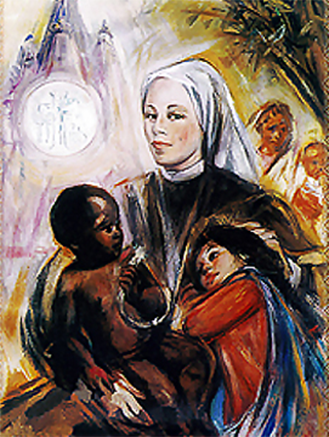 Mother Seraphina (Francesca Farolfi)
Mother Seraphina (Francesca Farolfi)
was born on 7 October 1853 at Tossignano in Italy. At the age of 20, with a Certificate in Teacher’s Training, she joined the religious Congregation of
the Franciscan Tertiaries of St. Elizabeth at Forli.
On 4 November 1873 the young Francesca was appointed Headmistress of St. Francis School, Forli. Very soon she drafted the Rules and Regulations of St.
Francis School and a Handbook for the Teachers. In 1881, Seraphina was sent to Polignano to open a convent and a school and ten years later another at Bagno.
Unforeseen events caused the transfer of St. Francis School from Forli to Bertinoro and the subsequent birth of a new religious Congregation.
The Clarist Franciscan Missionaries of the Most Blessed Sacrament (CFMSS) – the new Congregation founded by Mother Seraphina and officially approved by Rome,
came into being on 1 May 1898 opening branch houses in various parts of Italy and the world over. On 3 February 1901, four young Sisters set sail for India in
order to serve the women and children especially destitute in the Gangetic Plains. They initiated their mission at Sardhana, taking care of the Welfare Home
for Girls.
Three years later a school was opened at Meerut and another orphanage at Agra in 1912. On 30 May 1907 four zealous missionaries sailed for Brazil with the
specific aim of educating the tribal people in the backward areas of Minas Gerais. Itambacury (1907), Diamantina (1909) and Concecao (1910) – all home to
the Xavatos, Pugixao, Bugre and other woodsmen, became the scene of the educative/medical activities of the CFMSS When the earthquake of 1908 rendered many
a child homeless, Seraphina opened Welfare Centres to shelter the orphaned girls. Medical Care became a regular feature of the mission of the CFMSS , ever since
Italy entered the First World War.
However, Seraphina’s avowed aim was the education for the girl child. Her education policy was geared to the integral formation of the pupils with stress
on character training, and practical skills in fine arts and household works. She always urged the teachers to be role models to the pupils through their
comprehensive knowledge of the subject matter, effective teaching methods and above all, by the example of their own upright character. She insisted , too,
on the teachers “keeping themselves abreast of scientific progress, new findings and whatever can contribute to sharpen their intellect.” Mother Seraphina –
a person of frail constitution since her entry into religion, passed away after a prolonged illness on 18 June 1917.“Education without religion is not true
education. Whoever desires to acquire knowledge should commit oneself to the study of virtue.”
[MOTHER SERAPHINA]
“Education consists of leading a man, as a thinking, intelligent being, growing into self – consciousness to a pure and unsullied, conscious and free
representation of the inner law of Divine Unity, and in teaching him ways and means thereto .”
[MOTHER SERAPHINA]
“Education without religion is not true education. whoever wishes to acquire knowledge should first commit himself / herself to the study of virtue.”
[MOTHER SERAPHINA] EDUCATION PHILOSOPHY
Mother Seraphina considered school as an effective agent in promoting the integral formation of the child in the Gospel’s spirit of love and freedom:
an inclusive love that excludes no one because of religion, region, race, or ethnicity in order to shape a better human society.
To her the school was a God-given vineyard, the classroom a greenhouse where each child with her unique character – whether highborn or lowborn - had to be
tendered and nurtured with love, concern and solicitude. She believed that the most effective teachers are artists at discovering, recognizing, encouraging and
fostering the unique interests and abilities of each individual pupil. An individual knowledge of the children entrusted to their care was required of both the
Principal and the staff in order to help develop their particular talents, snip their vices and cultivate virtues. Mother Seraphina advises the teachers to be
compassionate with the tantrum of the growing adolescent,
to be prudent in handing out rewards, vigilant in giving the students no occasions to be defiant and discontent by denying them their rightful needs or
treating them harshly. A teacher must be a mother/father, counselor, guide, friend and a confidant / confidante to the pupils. She wanted each girl to be
acquainted with the fine arts and crafts and household skills not only to keep themselves occupied in their free time but also to become diligent homemakers,
exemplary mothers and above all, useful citizens - pride of their families and the wealth of the society. Seraphinan Education emphasizes: - the inner formation
of the child; development of each one’s talents and potential. - Acquisition of life skills, lasting values, fine conscience and social concern. - a pedagogy of
heart aimed at forming a community of persons- including the highborn and the lowborn, the advantaged and the marginalized alike - with mutual responsibility and
accountability. - A faculty of well-qualified committed persons, ever keen on updating themselves with the latest teaching techniques, and being Role Models